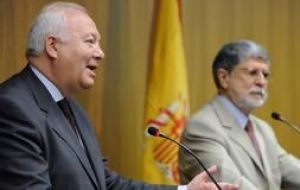MercoPress. South Atlantic News Agency
Spain, Brazil Seek Info on Possible U.S. Bases in Colombia
 Spain’s Miguel Angel Moratinos and Brazilian counterpart Celso Amorim
Spain’s Miguel Angel Moratinos and Brazilian counterpart Celso Amorim The foreign ministers of Spain and Brazil on Thursday demanded information about Colombia’s plans to establish U.S. bases on its territory, a move that some feel raises the risk of a “militarization” of the region.
Spain’s Miguel Angel Moratinos and Brazilian counterpart Celso Amorim expressed their reservations about the effects the military program could have at a press conference within the framework of the Spanish official’s visit to Brazil.
The two ministers also called for dialogue between Venezuela and Colombia and agreed to work “to avoid a spiral of misunderstandings” between those two countries.
Venezuelan President Hugo Chavez “froze” relations with Colombia and withdrew his diplomatic personnel after the announcement by the government of Alvaro Uribe about a prospective agreement that would allow the stationing of U.S. military personnel at Colombian bases.
Moratinos said that it is necessary to avoid a “process of militarization in Latin America.”
He added that Spain had asked for information from the United States and Colombia regarding what he called a “new situation,” although he said that it was a “bilateral question.”
“What we have is to work so that there is no spiral of misunderstanding and try to get Venezuela and Colombia to return to having a relationship of respect. We have to rebuild confidence,” he said.
Moratinos said that during the meeting he held Wednesday with Chavez in Caracas, the Venezuelan leader expressed his “willingness to (engage in) dialogue.”
Amorim said that Brazil “has received some explanations from Colombia” about the bases, but he added that “the presence of troops from countries that do not belong to the region is always of concern” and “should be better explained.”
Besides analyzing the regional situation, the two ministers reviewed the state of bilateral relations and spoke about the interest in increasing reciprocal investments.
Moratinos said that Spain wants to take advantage of the opportunities offered by the Growth Acceleration Plan being pushed by the Brazilian government, which predicts investments over the coming years of $260 billion.
He declared that this interest extends to many areas, and he said that Spanish firms have an interest in participating in the construction of the high-velocity train line that is planned to run between Rio de Janeiro and Sao Paulo, the bidding for which is expected to be begun before the end of the year.
“Spain wants to be in that high velocity (train project). We are in our country, in Europe and we want to accompany this new bet on the future that Brazil is making,” Moratinos said.
He said that Spanish investment in Brazil, which has the second largest volume after U.S. investment, is “very diversified and powerful.”
Amorim said he was receptive to the interest of Spanish companies, but he complained that Brazilian firms do not have a similarly easy time investing in construction projects in Spain.
On trade, the ministers expressed their confidence that the resumption of negotiations between the European Union and the Brazil-led Mercosur bloc will get a new push during Spain’s turn in the EU presidency in the first half of 2010.
Moratinos thanked Brazil for the support it had always provided to help Spain join the broadened G-20 and have responsibilities for the reform of that grouping. EFE

Top Comments
Disclaimer & comment rules-

Read all commentsIs this the same Brazil building nuclear subs, and the same Spain with internal terrorism problems (ETA)?
Aug 02nd, 2009 - 09:34 am 0Commenting for this story is now closed.
If you have a Facebook account, become a fan and comment on our Facebook Page!